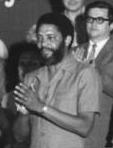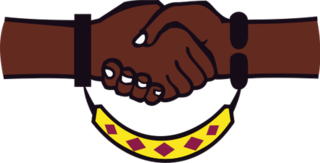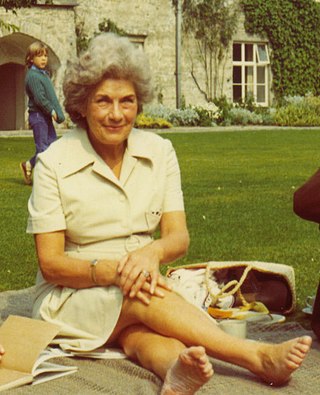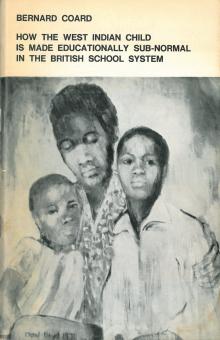The history of Grenada in the Caribbean, part of the Lesser Antilles group of islands, covers a period from the earliest human settlements to the establishment of the contemporary nationstate of Grenada. First settled by indigenous peoples, Grenada by the time of European contact was inhabited by the Caribs. British colonists killed most of the Caribs on the island and established plantations on the island, eventually importing African slaves to work on the sugar plantations.

The United States and a coalition of six Caribbean countries invaded the small island nation of Grenada, 100 miles (160 km) north of Venezuela, at dawn on 25 October 1983. Codenamed Operation Urgent Fury by the U.S. military, it resulted in military occupation within a few days. It was triggered by strife within the People's Revolutionary Government, which led to the house arrest and execution of the previous leader and second Prime Minister of Grenada, Maurice Bishop, and to the establishment of the Revolutionary Military Council, with Hudson Austin as chairman. Following the invasion there was an interim government appointed, and then general elections held in December 1984.

Maurice Rupert Bishop was a Grenadian revolutionary and the leader of the New Jewel Movement (NJM) – a Marxist–Leninist party that sought to prioritise socio-economic development, education and black liberation. The NJM came to power during the 13 March 1979 revolution which removed Prime Minister Eric Gairy from office. Bishop headed the People's Revolutionary Government of Grenada (PRG) from 1979 to 1983. In October 1983 he was deposed as Prime Minister and executed during a coup engineered by Deputy Prime Minister Bernard Coard. This quickly led to the demise of the PRG.
Winston Bernard Coard is a Grenadian politician who was Deputy Prime Minister in the People's Revolutionary Government of the New Jewel Movement. Coard launched a coup within the revolutionary government and took power for three days until he was himself deposed by General Hudson Austin.

The New Joint Endeavor for Welfare, Education, and Liberation, or New JEWEL Movement (NJM), was a Marxist–Leninist vanguard party in the Caribbean island nation of Grenada that was led by Maurice Bishop.

Sir Paul Godwin Scoon was a Grenadian politician who served as governor-general of Grenada from 1978 to 1992. His tenure is notable for the hectic events related to the rise and fall of the People's Revolutionary Government, as well as his personal involvement in and support of the invasion of Grenada.

Jon Michael Geoffrey Manningham Adams, known as Tom Adams, was a Barbadian politician who served as the second Prime Minister of Barbados from 1976 until 1985.

The People's Revolutionary Government (PRG) was proclaimed on 13 March 1979 after the Marxist–Leninist New Jewel Movement overthrew the government of Grenada in a revolution, making Grenada the only socialist state within the Commonwealth. In Grenada, the revolution is referred to as the March 13th Revolution of 1979 or simply as “The Revolution”. The government suspended the constitution and ruled by decree until a factional conflict broke out, culminating in an invasion by the United States on 25 October 1983.

The Congregation of Presentation Brothers is an international Catholic congregation of laymen founded in 1802 in Waterford, Ireland, by a local Irish businessman, Edmund Ignatius Rice, now Blessed Edmund Ignatius Rice. Presentation Brothers live and work in Ireland, England, USA, Canada, Ghana, Nigeria, Zimbabwe, Zambia and Grenada with about 100 brothers throughout these countries.

Kathleen ("Kaye") Webb, was a British editor and publisher. She has been called an "enormously influential children's editor" and "brilliant as an innovator of highly successful marketing strategies". She was awarded the Eleanor Farjeon Award in 1970.

Grenada is an island country of the West Indies in the eastern Caribbean Sea. The southernmost of the Windward Islands, Grenada is directly south of Saint Vincent and the Grenadines and about 100 miles (160 km) north of Trinidad and the South American mainland.

The People’s Revolutionary Army (PRA) was the military of Grenada between 1979 and 1983. The People's Revolutionary Militia served as its reserve force. The two, alongside the Grenada Police and the Coast Guard, were collectively termed as the People's Revolutionary Armed Forces (PRAF) from 1981.
Richard Hart was a Jamaican historian, solicitor and politician. He was a founding member of the People's National Party (PNP) and one of the pioneers of Marxism in Jamaica. He played an important role in Jamaican politics in the years leading up to Independence in 1962. He subsequently was based in Guyana for two years, before relocating to London, England, in 1965, working as a solicitor and co-founding the campaigning organisation Caribbean Labour Solidarity in 1974. He went on to serve as attorney-general in Grenada under the People's Revolutionary Government in 1983. He spent the latter years of his life in the UK, where he died in Bristol.
Caribbean Labour Solidarity (CLS), founded in 1974, is a group that "sets itself the task of informing the concerned about labour issues in the (Caribbean) region as a whole", and "continues to support the national and anti-imperialist fight in the West Indies", as well as being an international campaigning organisation. A 1980 CLS publication states: "Caribbean Labour Solidarity takes as its central concern the need for increased cohesion between the British labour movement and all components of the anti-imperialist and national democratic struggles in the Caribbean."
Jacob Ross FRSL is a Grenada-born poet, playwright, journalist, novelist and creative writing tutor, based in the UK since 1984.
Elean Roslyn Thomas was a Jamaican poet, novelist, journalist and activist. She was active in the struggle for women's rights in the Caribbean and the movement for Jamaican national independence, as well as working in Latin America, Eastern and Western Europe and Africa. She was married (1988–1998) to human rights barrister Anthony Gifford.
Norris Chrisleventon "Buzz" Johnson, generally known as Buzz Johnson, was a Tobago-born publisher and activist who in the 1970s relocated to England, UK. There he set up a small publishing company called Karia Press, based in east London, producing books relevant to community and race relations, and making available and better known the work of many key writers, including Claudia Jones, whom he is credited with having "rediscovered".
Jacqueline Creft was a Grenadian politician, one of the leaders of the revolutionary New Jewel Movement and Minister of Education in the People's Revolutionary Government from 1980 to 1983. She was executed in October 1983, along with Maurice Bishop, prime minister of the country and father of her son Vladimir (1977–1994).

How the West Indian Child Is Made Educationally Sub-normal in the British School System: The Scandal of the Black Child in Schools in Britain is a non-fiction book by Grenadian author Bernard Coard published in May 1971 by New Beacon Books in the United Kingdom. In the book, Coard examines educational inequality and institutional racism in the British educational system through the lens of the country's "educationally subnormal" (ESN) schools—previously called "schools for the mentally subnormal"—which disproportionately and wrongly enrolled Black children, especially those from the British Caribbean community. These students rarely advanced out of ESN schools and suffered educationally and economically. Coard also intentionally made a "critical decision" to write specifically for an audience of Black parents.
Lisa Allen-Agostini is a Trinidadian journalist, editor and writer of fiction, poetry and drama. She is also a stand-up comedian, performing as "Just Lisa".








